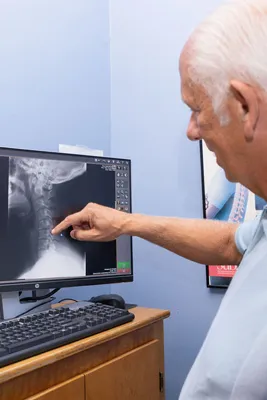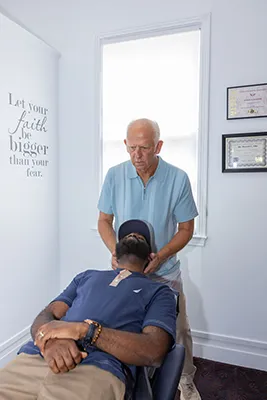Struggling with Vertigo in Mobile AL?

Vertigo can literally turn your life upside down. Many people with vertigo seek out a Mobile AL chiropractor and find a great deal of improvement in their condition. It is a condition marked by dizziness, and living with it makes even the simplest functions of day-to-day living a struggle. Many people find it difficult to get information about what exactly is causing their vertigo, and therefore, what the best available treatments are. This article will hopefully help you to understand the common causes of Vertigo as well as explain how chiropractic adjustments can help you to find relief.
Could Chiropractic Care Help Balance Issues Associated with Vertigo?
Dr. Donald Ellis D.C. – Discover Chiropractic Center Mobile AL
First, let’s introduce a few words that will tie together vertigo and the chiropractic adjustment. Those being “torsion” and “subluxation”.
Torsion - Defined: noun
1. the action of twisting or the state of being twisted, especially of one end of an object relative to the other
Subluxation - Defined:
1. According to D.D. Palmer, the founder of chiropractic, a subluxation is defined as a partial dislocation or misalignment of a vertebra causing impingement on nerves, which causes interference with the nervous system, leading to various health problems. He believed this interference with nerve function could manifest as disease or dysfunction in other parts of the body.
Could Cranial Nerve VIII Be Affected by Cervical Manipulation?
Cranial nerve VIII, also known as the vestibulocochlear nerve, deals primarily with hearing and balance. Though it doesn't directly connect to the spinal cord, it influences spinal cord activity through connections in the brainstem. Specifically, the vestibular nuclei within the brainstem, which receive input from the vestibular portion of cranial nerve VIII.
What Does This Word “Vestibular” Even Mean?
Vestibular – Defined: adjective
Anatomy
1. Relating to a vestibule, particularly that of the inner ear, or more generally to the sense of balance.
So far, does any of this information seem to be associated with vertigo in any manner? Short and quick, the answer is yes.
Back to the vestibulospinal tract. Vestibulospinal tracts are descending tracts – meaning they go downward – and are present in the spinal cord. The spinal cord carries a bundle of nerve fibers that take information from the higher centers of the brain to the peripheral parts of the body. These tracts help regulate posture, balance, and movements of the head, neck, and limbs.
The vestibular nuclei in the brainstem run down the spinal column via two main tracts:
- Lateral Vestibulospinal Tract (LVST): This tract originates primarily in the lateral (outside) vestibular nucleus and extends down the entire length of the spinal cord. It plays a crucial role in maintaining balance and posture by facilitating the contraction of extensor muscles in the limbs and trunk.
- Medial Vestibulospinal Tract (MVST): This tract mainly arises from the medial (inside) and inferior vestibular nuclei and goes down bilaterally in the spinal cord, terminating primarily in the cervical and upper thoracic segments. It is responsible for controlling head and neck posture and coordinating head and eye movements.
In essence, while the lateral vestibulospinal tract influences muscle activity throughout the entire spinal column, the medial vestibulospinal tract focuses its influence on the neck and upper torso.
Coming up is a learning moment.
Can Vestibulospinal Tract Dysfunction Affect Vertigo?
Let’s role play a little. If you type in a Google Search for “can the vestibulospinal tract affect vertigo,” Ai will give you this response… “Yes, the vestibulospinal tract can affect vertigo. It's a crucial part of the vestibular system, which plays a significant role in maintaining balance and spatial orientation. Vertigo, the sensation of spinning or whirling, can arise from dysfunction within the vestibular system, including the vestibulospinal tract.”
Vertigo Relief in Mobile AL
Before we get into talking about the causes of vertigo, let’s go over some of the most common symptoms to help you determine if this is what you are dealing with. Two different kinds of dizziness are often assumed to be Vertigo. Sometimes people say that they feel dizzy when they actually mean that they feel like they are going to pass out or faint.
Others say they feel dizzy when they perceive objects around them spinning and moving. Vertigo is a medical term that is used to describe the second situation. It is important to differentiate between the two sensations because each has a different set of causes and appropriate care.
Vertigo can range from a small nuisance to an indication of a severe underlying condition. Contrary to popular belief, dizziness is not the only symptom associated with this disorder. Some of the symptoms of vertigo that commonly accompany dizziness are:
- Blurry vision or difficulty focusing
- Problems hearing, especially in one ear
- Ringing ears
- Trouble maintaining balance
- Feeling fatigued or tired all the time
- Double vision


Causes of Vertigo
As we already mentioned, there are a variety of different causes of vertigo. At times it can be caused by a severe underlying issue, therefore, it is of vital importance to be examined by a medical professional if you are experiencing symptoms. The following is a list of some of the most common causes of vertigo:
- Severe headaches such as migraines or tension headaches
- Chronic ear aches or damage to the inner ear
- A lack of blood flow to the brain
- Car accidents result in damage to the joints and ligaments throughout the spine
- Misalignments or subluxations of the vertebrae in the neck
 As you can see, vertigo commonly starts with issues involving the head, inner ear, and spine. These areas play an important role in how the body orients itself and maintains balance. Vertigo commonly results from a disruption in the signals sent from the nerves of the spine to the brain. When signals that would normally keep us balanced become distorted and scrambled symptoms of dizziness can occur.
As you can see, vertigo commonly starts with issues involving the head, inner ear, and spine. These areas play an important role in how the body orients itself and maintains balance. Vertigo commonly results from a disruption in the signals sent from the nerves of the spine to the brain. When signals that would normally keep us balanced become distorted and scrambled symptoms of dizziness can occur.
Chiropractic Care for Vertigo
Chiropractic adjustments are a gentle and safe approach to overcoming many of the causes of vertigo. A chiropractic care plan begins with a thorough evaluation that will determine the exact cause of your vertigo and the most appropriate methods to help the body respond. You should be asking, “Who is the best chiropractor near me that has had good results treating and causing relief of vertigo?” The chiropractor at Discover Chiropractic Center in Mobile AL is Dr. Donald Ellis, who can provide the necessary adjustments to help stabilize the nervous system’s function to help you own body’s natural ability to either get rid of or lessen your dizziness as it relates to vertigo.
*Due to extenuating circumstances, the office hours may vary. Please call the office to confirm we are open.
OFFICE HOURS*
Monday
8:30am - 12:00pm
2:00pm - 6:00pm
Tuesday
8:30am - 12:00pm
2:00pm - 6:00pm
Wednesday
8:30am - 12:00pm
2:00pm - 6:00pm
Thursday
8:30am - 12:00pm
2:00pm - 6:00pm
Friday
8:30am - 12:00pm
Saturday & Sunday
Closed
Discover Chiropractic Center
1412 Dauphin St
Mobile, AL 36604




